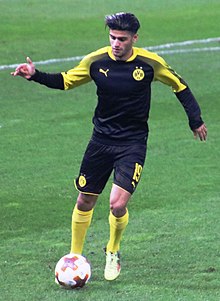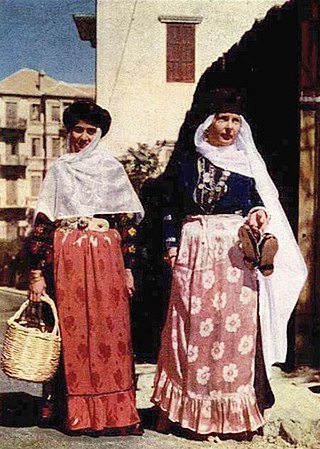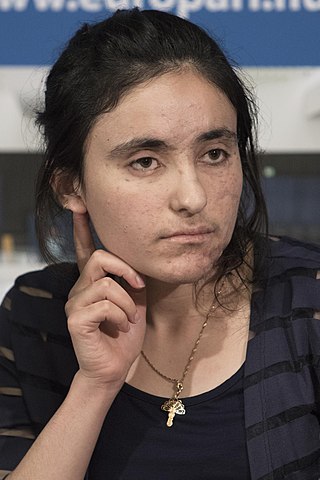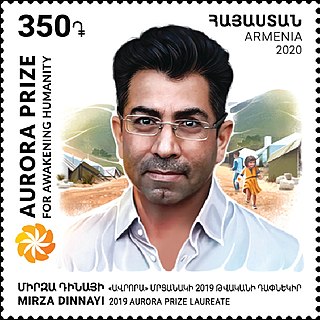This article includes a list of general references, but it lacks sufficient corresponding inline citations .(May 2022) |
This is a list of notable individuals who are of full or partial Kurdish origin who grew up and/or live in Germany.
This article includes a list of general references, but it lacks sufficient corresponding inline citations .(May 2022) |
This is a list of notable individuals who are of full or partial Kurdish origin who grew up and/or live in Germany.





in German parties

in foreign parties or organisations



Kurdish literature is literature written in the Kurdish languages. Literary Kurdish works have been written in each of the four main languages: Zaza, Gorani, Kurmanji and Sorani. Ali Hariri (1009–1079) is one of the first well-known poets who wrote in Kurdish. He was from the Hakkari region.

Sinjar is a town in the Sinjar District of the Nineveh Governorate in northern Iraq. It is located about five kilometers south of the Sinjar Mountains. Its population in 2013 was estimated at 88,023, and is predominantly Yazidi.
Kurdish cinema focuses on the Kurdish people and culture. The fate of the Kurds as a people without a state shaped their cinema. Kurdish films often show social grievances, oppression, torture, human rights violations, and life as a stranger. Kurdish cinema has a high significance for the Kurds, as it offers the opportunity to draw attention to their own situation artistically. However, because of state repression, most films are produced in exile. The best example of this is in Turkey, where Kurds were not permitted to speak their native language until 1991, which made the development of their films more difficult.

Kurds in Lebanon are people born in or residing in Lebanon who are of full or partial Kurdish origin. Estimates on the number of Kurds in Lebanon prior to 1985 were around 60,000. Today, there are tens of thousands of Kurds in Lebanon, mainly in Beirut.
The People's Labour Party, sometimes translated as the People's Work Party, was a pro-Kurdish political party in Turkey.

Kurds in Germany are residents or citizens of Germany of full or partial Kurdish origin. There is a large Kurdish community in Germany. The number of Kurds living in Germany is unknown. Many estimates assume that the number is in the million range. In February 2000, the Federal Government of Germany estimated that approximately 500.000 Kurds lived in Germany at that time.

The Kurdish National Council is a Syrian Kurdish political party. While the KNC had initially more international support than the ruling Democratic Union Party (PYD) during the early years of the Syrian civil war and a strong supporter basis among some Syrian Kurdish refugees, the overwhelming popular support the PYD enjoys has eroded support for the KNC in Syrian Kurdistan, losing almost all popular support.
Aladağ is a Turkish place name that means "variegated mountain" and may refer to:

Ali Atalan is a Kurdish-German politician of Yazidi faith. He is a former member of the Landtag of North Rhine-Westphalia with Die Linke in Germany, and the Turkish Parliament with the Peoples' Democratic Party (HDP).

Tunceli Province, formerly Dersim Province, is a province in the Eastern Anatolia Region of Turkey. The province is considered part of Turkish Kurdistan and has a Kurdish majority. Moreover, it is the only province in Turkey with an Alevi majority. Its population is 84,366 (2022). The province has eight municipalities, 366 villages and 1,087 hamlets.

Yazidis in Germany may refer to people born in or residing in Germany of Yazidi origin, an ethnic group or Kurdish group who are strictly endogamous.

Lamiya Haji Bashar is a Yazidi human rights activist. She was awarded the Sakharov Prize jointly with Nadia Murad in 2016.
Kocho is a village in Sinjar District, south of the Sinjar Mountains in the Nineveh Governorate of Iraq. It is considered one of the disputed territories of Northern Iraq and is populated by Yazidis. The village came to international attention in 2014 due to the genocide of Yazidis committed by the Islamic State.

Düzen Tekkal is a German author, television journalist, filmmaker, war correspondent, political scientist, and social entrepreneur of Kurdish descent. She is Yazidi.

Mirza Dinnayi — Iraqi writer and Yazidi social activist, Aurora Humanitarian Award 2019 laureate.
Alphabetical index of articles about the Yazidis, and their history and culture.
Whenever I'm asked about my nationality, I say, "I'm a German of Kurdish and Turkish descent."
The second-generation filmmaker Ayşe Polat's response to a question about how she describes her identity underscores the complexity of the issue, for she states that she is simultaneously German, Turkish and Kurdish.
Born in Istanbul to a Turkish mother and a Kurdish father, she emigrated with her parents to what was then West Berlin in the late 1960s, part of the first large wave of Muslim immigrants who came to fill the blue-collar jobs needed to rebuild the German economy after World War II. Ms. Ates was 6 when she and her four siblings moved into a one-room apartment with their parents.